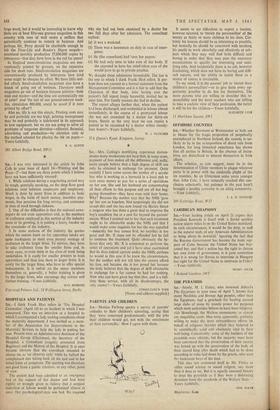SIR,—Mrs. Catling's mortifying experience demon- strates many weaknesses not least
that, in some cases, payment of fees makes all the difference and, sadly, many people believe that a high degree of skill can only be obtained in exchange for payment. Quite recently I have come across the mother of a spastic boy who is working as a barmaid in a local pub to earn extra money to pay for a series of operations on her son. She and her husband are concentrating all their efforts to this purpose and are all but beg- garing themselves—they have even sold their home. Why? Because the mother says that the NHS 'gave up' her son as hopeless. Not surprisingly she did not accept this and she has now found via Harley Street a surgeon who has done a great deal to improve the boy's condition but at a cost far beyond the parents' means. When I pointed out to her that such treatment ought to be obtainable under the NHS and that I would make some inquiries for her she was appalled —naturally her boy comes first, no sacrifice is too great and Mr. X must not be offended lest he fail to continue the treatment. Quite obviously she be- lieves that only Mr. X is competent to perform the series of operations and yet I have since ascertained that he does indeed operate under the NHS; perhaps he would in this case if he knew the circumstances, but the mother will not tell him she cannot afford his fees, not because she is too proud but because she truly believes that the degree of skill obtainable in exchange for a fee cannot be- had for nothing. Now who can have given her that idea, and is a full- time State service, with all its disadvantages, the only answer?—Yours faithfully,






































 Previous page
Previous page